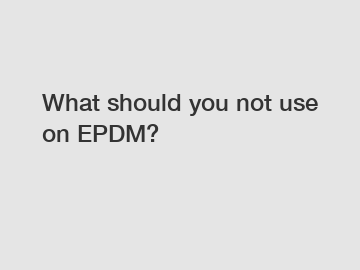What should you not use on EPDM?
EPDM, or Ethylene Propylene Diene Monomer, is a highly durable and versatile synthetic rubber commonly used in the construction industry. Its excellent resistance to heat, weathering, and ozone make it a popular choice for roofing, sealing, and other applications. However, while EPDM offers numerous advantages, there are certain substances and materials that should never be used on it. In this article, we will explore what you should avoid when working with EPDM to ensure its longevity and performance.
1. Petroleum-Based Products:
EPDM is highly sensitive to oil, grease, and petroleum-based products. These substances can cause the rubber to break down and lose its integrity over time. Avoid using oil or grease-based sealants, adhesives, cleaners, or solvents on EPDM surfaces. Instead, opt for water-based alternatives that are specifically formulated for EPDM rubber.

2. Abrasive Cleaners:
Harsh abrasive cleaners, including scouring pads or rough materials, should be avoided when cleaning EPDM surfaces. These can cause scratches or wear down the rubber, leading to premature aging and degradation. Use mild, non-abrasive cleaners, such as soap and water, to maintain the cleanliness of your EPDM installations.
3. Solvents:
Certain solvents, such as acetone, toluene, or xylene, can chemically attack and weaken EPDM. Avoid using solvents to clean or remove adhesive residues from EPDM surfaces. Instead, use specialized cleaners or adhesive removers that are safe for use on EPDM.
4. Chlorinated Solvents:
Chlorinated solvents, like trichloroethylene or methylene chloride, should never come into contact with EPDM. These solvents can cause severe damage to the rubber, leading to swelling, cracking, or complete failure of the material. Be cautious when using any cleaning or maintenance products and always read the labels to ensure they are safe for EPDM surfaces.
5. Petroleum Jelly:
While petroleum jelly is a common household item with various uses, it should never be used on EPDM surfaces. This product can soften the rubber, causing it to lose its elasticity and create an environment for dirt and debris to accumulate. Instead, use EPDM-approved lubricants or silicone-based products if lubrication is required.
6. Ozone:
While EPDM is highly resistant to ozone, prolonged exposure to high ozone levels can cause surface degradation. Ozone can attack the double bonds in the EPDM molecular structure, leading to cracking, brittleness, or discoloration. To protect your EPDM installations from ozone damage, consider using ozone-resistant coatings or regularly applying EPDM-compatible sealants.
7. Asphalt-Based Products:
Avoid using asphalt-based products directly on EPDM surfaces. Asphalt can soften and dissolve EPDM rubber, leading to failure and reduced lifespan of the material. If necessary, use EPDM-compliant protective barriers or coverings before applying asphalt-based materials onto EPDM roofs or membranes.
8. Sharp Objects:
EPDM is generally highly puncture-resistant. However, sharp objects, such as knives, pointed tools, or even high heels, can potentially puncture or damage the rubber membrane. It is crucial to exercise caution and avoid dragging or sliding any sharp objects across EPDM surfaces. Promptly repair any punctures or damage to prevent moisture infiltration and ensure EPDM's performance.
In conclusion, taking care of your EPDM installations involves avoiding certain substances and materials that can compromise its durability and longevity. By staying away from petroleum-based products, abrasive cleaners, solvents, chlorinated solvents, petroleum jelly, ozone exposure, asphalt-based products, and sharp objects, you can ensure the optimal performance of your EPDM roofing, sealing, or other applications. Always refer to the manufacturer's guidelines and consult with professionals if you have any specific concerns or questions regarding your EPDM project.
For more custom epdm strip supplier, wholesale sealed electrical enclosure manufacturer, custom electrical enclosure door sealinformation, please contact us. We will provide professional answers.
230
0
0

Comments
All Comments (0)